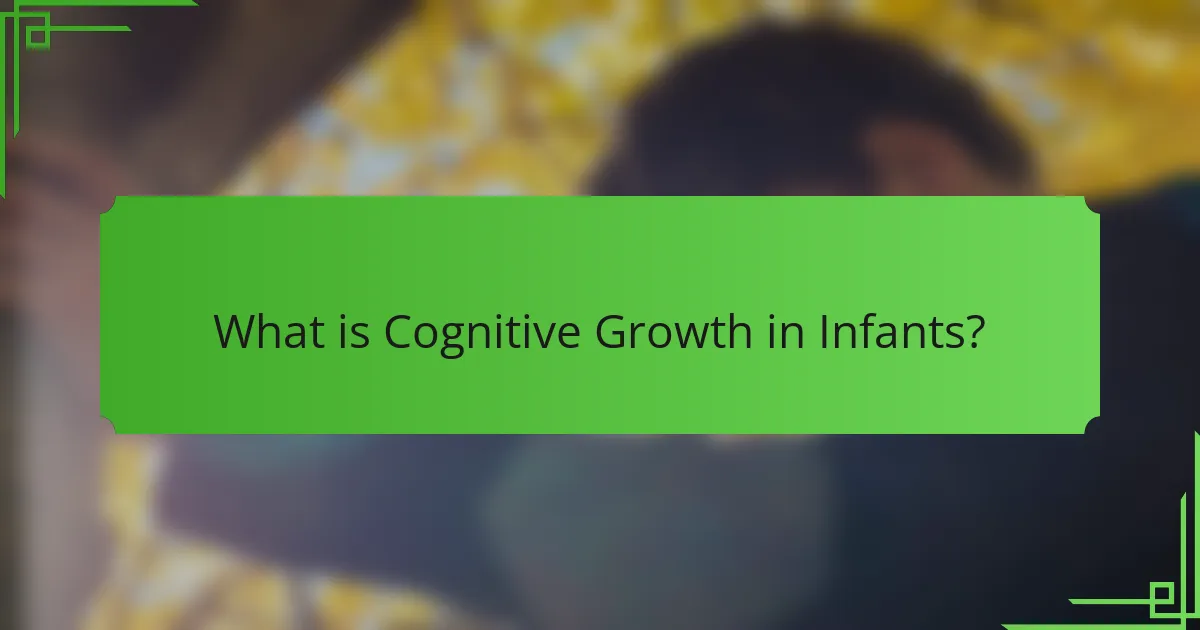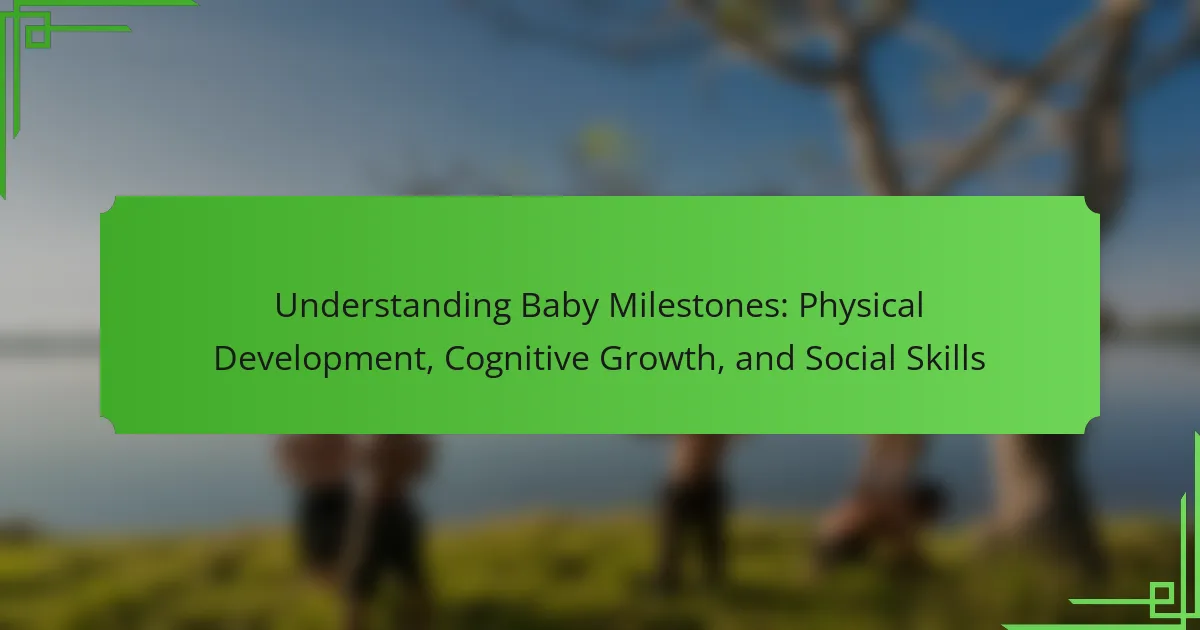Baby milestones encompass key physical abilities, cognitive growth, and social skills that infants typically achieve during their early development. Physical milestones include actions such as rolling over, sitting up, crawling, standing, and walking, which indicate stages of motor skill progression. Cognitive growth involves the development of thinking, learning, and problem-solving abilities, influenced by environmental factors and parental interaction. Social skills emerge through interactions with caregivers, where infants learn to respond to social cues and develop preferences for familiar individuals. Understanding these milestones is essential for caregivers to assess a child’s overall development and identify any potential delays.

What are Baby Milestones in Physical Development?
Baby milestones in physical development refer to key physical abilities that infants typically achieve as they grow. These milestones include actions such as rolling over, sitting up, crawling, standing, and walking. Each milestone indicates a stage of growth and coordination in a baby’s motor skills. For example, most babies roll over by around 4 to 6 months. Sitting up without support usually occurs between 6 to 8 months. Crawling typically happens around 8 to 10 months, while standing with support is often seen by 9 to 12 months. Finally, walking independently usually occurs between 12 to 15 months. Tracking these milestones helps caregivers assess a child’s development and identify any potential delays.
How do we define physical milestones for infants?
Physical milestones for infants are defined as specific physical abilities that children typically achieve at certain ages. These milestones include actions such as rolling over, sitting up, crawling, and walking. Each milestone is associated with a general age range when most infants are expected to accomplish it. For example, infants usually roll over by 4 to 6 months and begin to walk around 12 months. Tracking these milestones helps caregivers monitor a child’s development. Pediatricians often use these benchmarks to assess growth and identify any potential developmental delays. Research has shown that reaching these milestones is crucial for overall physical and cognitive development.
What are the key stages of physical development in babies?
The key stages of physical development in babies include several critical milestones. These stages typically occur in a predictable sequence.
From birth to three months, babies develop basic reflexes. They can grasp objects and react to stimuli. At three to six months, babies gain better control over their movements. They start to roll over and sit with support.
By six to nine months, babies begin to crawl. They also start pulling themselves up to stand. At nine to twelve months, many babies can walk with assistance. Some may take their first independent steps.
These milestones are supported by developmental research. The Centers for Disease Control and Prevention (CDC) outlines these stages as part of typical growth patterns.
How do gross motor skills evolve during infancy?
Gross motor skills evolve through distinct stages during infancy. Infants initially exhibit reflexive movements. These reflexes include grasping and rooting, which are present at birth. By around two months, infants begin to gain better control over their head and neck. At four to six months, they can roll over and sit with support. By eight to ten months, they often crawl and may pull themselves up to stand. Between twelve to fifteen months, many infants take their first independent steps. These milestones reflect the development of muscle strength and coordination. Each stage builds upon the previous one, demonstrating the progression of gross motor skills.
Why are physical milestones important for overall development?
Physical milestones are crucial for overall development because they indicate a child’s physical growth and capability. These milestones reflect the development of motor skills, which are essential for daily activities. Achieving physical milestones supports cognitive development by enhancing spatial awareness and coordination. For instance, crawling and walking allow children to explore their environment, promoting curiosity and learning. Furthermore, physical milestones are linked to social skills as they enable children to interact with peers through play. Research shows that children who meet these milestones on time tend to have better social and cognitive outcomes later in life. Tracking these milestones helps parents and caregivers identify any developmental delays early on, ensuring timely interventions.
How do physical milestones relate to health and safety?
Physical milestones are crucial indicators of a child’s health and safety. They reflect a child’s physical development and ability to perform essential tasks. For example, achieving milestones like rolling over or sitting up shows muscle strength and coordination. These skills are necessary for safe exploration of the environment. Delayed milestones may indicate potential health issues, such as developmental disorders. Monitoring milestones helps caregivers identify when a child may need additional support. Regular check-ups often include assessments of these milestones. This proactive approach ensures timely interventions, promoting overall well-being.
What signs indicate healthy physical development in babies?
Signs that indicate healthy physical development in babies include reaching developmental milestones on time. Babies typically begin to roll over by six months. By nine months, they should sit without support. Crawling usually starts around eight to ten months. Standing with support can occur by nine to twelve months. Walking independently often happens between twelve to fifteen months. Additionally, a healthy baby shows good muscle tone and coordination. Regular check-ups can confirm these developmental progressions. Pediatric guidelines suggest monitoring these milestones closely to ensure proper growth.

What is Cognitive Growth in Infants?
Cognitive growth in infants refers to the development of their thinking, learning, and problem-solving abilities. This growth occurs rapidly during the first two years of life. Infants begin to recognize faces, respond to sounds, and engage in interactive play. They learn through exploration and sensory experiences. Research shows that by age one, infants can understand simple words and gestures. By 18 months, they can follow simple instructions. Cognitive growth is influenced by environmental factors, such as parental interaction and stimulation. Studies indicate that enriched environments enhance cognitive development in early childhood.
How can we identify cognitive milestones in babies?
Cognitive milestones in babies can be identified through specific observable behaviors. These behaviors indicate the development of thinking, learning, and problem-solving skills. For example, by six months, babies typically show awareness of their surroundings and respond to familiar faces. At around nine months, they may begin to understand object permanence, realizing that objects continue to exist even when out of sight. By one year, babies often demonstrate the ability to follow simple instructions and recognize their names. Research shows that these milestones align with developmental theories, such as those proposed by Jean Piaget, which outline stages of cognitive development in early childhood. Regular monitoring of these behaviors can help caregivers assess cognitive growth effectively.
What are the typical stages of cognitive development in infants?
Infants typically progress through four stages of cognitive development. These stages are based on Jean Piaget’s theory. The first stage is the Sensorimotor stage, occurring from birth to around 2 years. During this stage, infants learn through sensory experiences and motor actions. They explore the world by touching, looking, and manipulating objects.
The second stage is the Preoperational stage, which begins around age 2 and lasts until about age 7. In this stage, children start to use language and think symbolically. However, their thinking is still intuitive and egocentric.
The third stage is the Concrete Operational stage, occurring from ages 7 to 11. At this point, children begin to think logically about concrete events. They understand the concept of conservation, which means they recognize that quantity doesn’t change despite changes in shape.
Finally, the fourth stage is the Formal Operational stage, starting at around age 12. In this stage, individuals develop the ability to think abstractly and reason systematically. They can solve complex problems and think about hypothetical situations.
These stages illustrate the gradual progression of cognitive abilities in infants and young children.
How do sensory experiences contribute to cognitive growth?
Sensory experiences significantly contribute to cognitive growth by stimulating brain development. Engaging with different senses enhances neural connections. For example, tactile experiences encourage fine motor skills and spatial awareness. Visual stimuli help in recognizing patterns and colors, which aids memory. Auditory experiences foster language development and comprehension. Research indicates that infants exposed to diverse sensory input demonstrate improved problem-solving skills. A study by the National Institute of Child Health and Human Development found that sensory-rich environments promote cognitive flexibility. Thus, sensory experiences are vital for holistic cognitive development in infants.
Why is cognitive development crucial during infancy?
Cognitive development is crucial during infancy because it lays the foundation for future learning and behavior. During this period, infants rapidly acquire skills in thinking, problem-solving, and understanding their environment. Research indicates that early cognitive skills are linked to later academic success and social competence. For instance, studies show that children with strong cognitive abilities in infancy tend to perform better in school. Additionally, cognitive development influences emotional regulation and social interactions. The brain forms millions of neural connections during infancy, making this stage vital for cognitive growth. Engaging in stimulating activities promotes this development, enhancing memory and attention skills.
How does cognitive growth impact later learning and behavior?
Cognitive growth significantly influences later learning and behavior. As children develop cognitive skills, they enhance their ability to process information. Improved cognitive skills lead to better problem-solving abilities. This advancement allows children to engage more effectively in academic settings. Research shows that cognitive growth correlates with higher academic achievement in later years. For instance, a study published in the journal “Developmental Psychology” found that early cognitive skills predict later school performance. Additionally, cognitive growth fosters social skills, which are crucial for effective communication and relationships. Children with strong cognitive development tend to exhibit better emotional regulation. This regulation positively impacts their interactions with peers and adults. Overall, cognitive growth lays the foundation for successful learning and adaptive behavior in various life situations.
What role do parents play in fostering cognitive development?
Parents play a crucial role in fostering cognitive development in children. They provide stimulation through interaction, which enhances brain growth. Engaging in conversations with children promotes language skills and critical thinking. Parents also encourage exploration and problem-solving by allowing safe, guided play. Reading to children develops literacy and comprehension abilities. Research shows that children with involved parents score higher on cognitive tests. The National Institute of Child Health and Human Development highlights the importance of parental involvement in early learning. This involvement lays the foundation for lifelong cognitive skills.

How do Social Skills Develop in Infants?
Social skills develop in infants through interactions with caregivers and their environment. Infants begin by responding to social cues, such as [censured] expressions and voices. They engage in eye contact and smile in response to others. This interaction helps them learn about social norms and emotional responses. As they grow, infants start to imitate actions and expressions of those around them. This imitation fosters communication and bonding. By around six months, infants show preferences for familiar people and react differently to strangers. Research shows that early social experiences significantly shape later social competence. These foundational experiences set the stage for more complex social interactions as they grow.
What are the key milestones for social skills in babies?
Key milestones for social skills in babies include several developmental stages. At around 2 months, babies begin to smile socially. By 4 to 6 months, they engage in reciprocal interactions, such as cooing and babbling. At 6 to 9 months, babies show interest in other children and respond to their emotions. By 9 to 12 months, they exhibit separation anxiety and may show preferences for familiar caregivers. At 12 to 18 months, babies start to engage in parallel play with peers. By 18 to 24 months, they begin to understand and express simple emotions, such as joy and frustration. These milestones are supported by research indicating that social skills develop progressively as babies interact with their environment and caregivers.
How does attachment influence social development?
Attachment significantly influences social development by shaping an individual’s ability to form relationships. Secure attachment leads to healthier social interactions and emotional regulation. Children with secure attachments often exhibit greater empathy and social competence. They are more likely to explore their environment, which fosters social learning. In contrast, insecure attachment can result in difficulties with trust and social anxiety. Research indicates that securely attached children show better peer relationships and are more likely to engage in cooperative play. Studies have shown that these children are often more resilient in social situations. Overall, attachment forms the foundation for effective social functioning throughout life.
What role does play have in developing social skills?
Play is essential for developing social skills in children. It provides opportunities for interaction with peers. Through play, children learn to communicate effectively. They practice sharing, taking turns, and resolving conflicts. These experiences contribute to emotional regulation and empathy. Research shows that children engaged in cooperative play demonstrate better social competence. A study by Ginsburg (2007) highlights that play enhances social understanding and relationship-building skills. Play also fosters collaboration, which is crucial for teamwork later in life. Overall, play is a fundamental aspect of social skill development in early childhood.
Why are social skills important for infants?
Social skills are crucial for infants as they lay the foundation for future relationships and communication. These skills enable infants to interact with caregivers and peers effectively. Early social interactions promote emotional development and help infants learn about empathy and sharing. Infants with strong social skills tend to adjust better in group settings, such as daycare or preschool. Research indicates that positive social interactions in infancy correlate with better social competence later in life. For instance, a study published in the Journal of Child Psychology and Psychiatry found that infants who engage in social play are more likely to develop strong peer relationships as they grow.
How do social skills affect a baby’s emotional well-being?
Social skills significantly influence a baby’s emotional well-being. Positive interactions with caregivers and peers foster secure attachments. These connections help babies develop trust and confidence. Additionally, social skills enable effective communication of needs and feelings. This communication reduces frustration and promotes emotional regulation. Research indicates that infants with strong social skills exhibit lower levels of anxiety and depression. Studies show that social engagement contributes to overall mental health in early development. Thus, nurturing social skills is vital for a baby’s emotional health.
What can caregivers do to support social skill development?
Caregivers can support social skill development by providing opportunities for interaction. Engaging children in playdates promotes sharing and cooperation. Encouraging group activities helps children learn to communicate effectively. Modeling positive social behaviors demonstrates appropriate interactions. Providing praise for social efforts reinforces good behavior. Reading books about friendships can spark discussions on social scenarios. Teaching conflict resolution strategies equips children with tools to handle disagreements. Observing and guiding social interactions allows caregivers to address challenges in real-time.
What are some practical tips for monitoring baby milestones?
To monitor baby milestones effectively, keep a detailed record of each milestone achieved. Use a milestone checklist to track physical, cognitive, and social developments. Regularly schedule pediatric check-ups to discuss progress with a healthcare professional. Engage in interactive play to encourage skill development and observe your baby’s responses. Take note of any delays and consult a pediatrician if concerns arise. Document dates and specific examples of milestones as they occur. Share this information during pediatric visits for better insights. Consistent observation helps in understanding your baby’s unique growth patterns.
How can parents track their baby’s development effectively?
Parents can track their baby’s development effectively by using milestone checklists. These checklists outline key physical, cognitive, and social milestones. Regular pediatric check-ups also provide professional assessments of development. Parents should observe their baby’s behaviors and compare them to established milestones. Keeping a journal of developmental changes can help identify patterns over time. Utilizing developmental apps can provide reminders and resources for tracking progress. Engaging with parenting groups allows for sharing experiences and advice. Research indicates that early tracking can lead to timely interventions if delays are observed. This proactive approach supports healthy development and addresses potential concerns promptly.
What resources are available for understanding baby milestones?
Books on child development provide comprehensive insights into baby milestones. “The Wonder Weeks” by Hetty van de Rijt and Frans Plooij outlines developmental leaps in babies. The American Academy of Pediatrics offers online resources detailing milestones by age. Websites like BabyCenter and What to Expect provide articles and community support. Pediatricians also serve as essential resources for personalized guidance on milestones. Parent support groups can offer shared experiences and advice. Online courses on platforms like Coursera cover child development topics. These resources collectively enhance understanding of baby milestones.
The main entity of the article is “baby milestones,” which encompasses key physical, cognitive, and social developmental stages that infants typically achieve as they grow. The article outlines essential physical milestones such as rolling over, sitting up, crawling, and walking, along with cognitive growth indicators like recognizing faces and following simple instructions. It emphasizes the importance of social skills development through interactions and play, highlighting how these milestones are crucial for overall health and future learning. Additionally, the article provides practical tips for caregivers on monitoring and supporting their baby’s development effectively.
